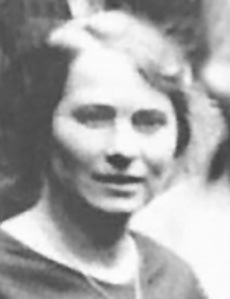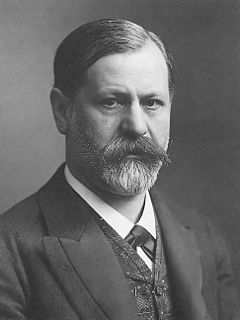Related Research Articles

Psychoanalysis is a set of theories and therapeutic techniques that deal in part with the unconscious mind, and which together form a method of treatment for mental disorders. The discipline was established in the early 1890s by Austrian neurologist Sigmund Freud, who developed the practice from his theoretical model of personality organization and development, psychoanalytic theory. Freud's work stems partly from the clinical work of Josef Breuer and others. Psychoanalysis was later developed in different directions, mostly by students of Freud, such as Alfred Adler and his collaborator, Carl Gustav Jung, as well as by neo-Freudian thinkers, such as Erich Fromm, Karen Horney, and Harry Stack Sullivan.

Sigmund Freud was an Austrian neurologist and the founder of psychoanalysis, a clinical method for treating psychopathology through dialogue between a patient and a psychoanalyst.
Psychoanalytic theory is the theory of personality organization and the dynamics of personality development that guides psychoanalysis, a clinical method for treating psychopathology. First laid out by Sigmund Freud in the late 19th century, psychoanalytic theory has undergone many refinements since his work. The psychoanalytic theory came to full prominence in the last third of the twentieth century as part of the flow of critical discourse regarding psychological treatments after the 1960s, long after Freud's death in 1939. Freud had ceased his analysis of the brain and his physiological studies and shifted his focus to the study of the mind and the related psychological attributes making up the mind, and on treatment using free association and the phenomena of transference. His study emphasized the recognition of childhood events that could influence the mental functioning of adults. His examination of the genetic and then the developmental aspects gave the psychoanalytic theory its characteristics. Starting with his publication of The Interpretation of Dreams in 1899, his theories began to gain prominence.
Perversion is a form of human behavior which deviates from what is considered to be orthodox or normal. Although the term perversion can refer to a variety of forms of deviation, it is most often used to describe sexual behaviors that are considered particularly abnormal, repulsive or obsessive. Perversion differs from deviant behavior, in that the latter covers areas of behavior for which perversion would be too strong a term. It is often considered derogatory, and, in psychological literature, the term paraphilia has been used as a replacement, though this term is controversial, and deviation is sometimes used in its place.
Repression is a key concept of psychoanalysis, where it is understood as a defence mechanism that "ensures that what is unacceptable to the conscious mind, and would if recalled arouse anxiety, is prevented from entering into it." According to psychoanalytic theory, repression plays a major role in many mental illnesses, and in the psyche of the average person.

Theodor Reik was a psychoanalyst who trained as one of Freud's first students in Vienna, Austria, and was a pioneer of lay analysis in the United States.

Relational psychoanalysis is a school of psychoanalysis in the United States that emphasizes the role of real and imagined relationships with others in mental disorder and psychotherapy. 'Relational psychoanalysis is a relatively new and evolving school of psychoanalytic thought considered by its founders to represent a "paradigm shift" in psychoanalysis'.

Ego psychology is a school of psychoanalysis rooted in Sigmund Freud's structural id-ego-superego model of the mind.

Sabina Nikolayevna Spielrein was a Russian physician and one of the first female psychoanalysts. She was in succession the patient, then student, then colleague of Carl Gustav Jung, with whom she had an intimate relationship during 1908–1910, as is documented in their correspondence from the time and her diaries. She also met, corresponded, and had a collegial relationship with Sigmund Freud. She worked with and psychoanalysed Swiss developmental psychologist Jean Piaget. She worked as a psychiatrist, psychoanalyst, teacher and paediatrician in Switzerland and Russia. In a thirty-year professional career, she published over 35 papers in three languages, covering psychoanalysis, developmental psychology, psycholinguistics and educational psychology. Among her works in the field of psychoanalysis is the essay titled "Destruction as the Cause of Coming Into Being", written in German in 1912.
Girindrasekhar Bose was an early 20th-century South Asian psychoanalyst, the first president (1922–1953) of the Indian Psychoanalytic Society. Bose carried on a twenty-year dialogue with Sigmund Freud. Known for disputing the specifics of Freud's Oedipal theory, he has been pointed to by some as an early example of non-Western contestations of Western methodologies. Apart from this, he also started the first general hospital psychiatry unit (GHPU) in India at the R.G. Kar Medical College, Calcutta in 1933.

Freudo-Marxism is a loose designation for philosophical perspectives informed by both the Marxist philosophy of Karl Marx and the psychoanalytic theory of Sigmund Freud. It has a rich history within continental philosophy, beginning in the 1920s and 1930s and running since through critical theory, Lacanian psychoanalysis, and post-structuralism.

Resistance, in psychoanalysis, refers to oppositional behavior when an individual's unconscious defenses of the ego are threatened by an external source. Sigmund Freud, the founder of psychoanalytic theory, developed his concept of resistance as he worked with patients who suddenly developed uncooperative behaviors during sessions of talk therapy. He reasoned that an individual that is suffering from a psychological affliction, which Freud believed to be derived from the presence of suppressed illicit or unwanted thoughts, may inadvertently attempt to impede any attempt to confront a subconsciously perceived threat. This would be for the purpose of inhibiting the revelation of any repressed information from within the unconscious mind.
Sheldon Bach was an American psychologist and psychoanalyst based in New York City.

Freud's seduction theory was a hypothesis posited in the mid-1890s by Sigmund Freud that he believed provided the solution to the problem of the origins of hysteria and obsessional neurosis. According to the theory, a repressed memory of an early childhood sexual abuse or molestation experience was the essential precondition for hysterical or obsessional symptoms, with the addition of an active sexual experience up to the age of eight for the latter.
Edward George Glover was a British psychoanalyst. He first studied medicine and surgery, and it was his elder brother, James Glover (1882–1926) who attracted him towards psychoanalysis. Both brothers were analysed in Berlin by Karl Abraham; indeed, the "list of Karl Abraham's analysands reads like a roster of psychoanalytic eminence: the leading English analysts Edward and James Glover" at the top. He then settled down in London where he became an influential member of the British Psycho-Analytical Society in 1921. He was also close to Ernest Jones.

Victor Ovcharenko was a Russian philosopher, sociologist, historian and psychologist. He also was a PhD., professor, academician of the Russian Academy of Natural Sciences (1997), academician of the Academy for Humanities Research (1998) and academician of the Academy of Pedagogical and Social Sciences (2000). He co-edited the journals "The Psychoanalytical Bulletin", "The Bulletin of Psychoanalysis", etc. He was a forerunner of the Minsk philosophical school "Humanities Encyclopedia". He is considered one of the founders of modern Belarusian sociology.
Psychoanalytic sociology is the research field that analyzes society using the same methods that psychoanalysis applied to analyze an individual.

Freud and Philosophy: An Essay on Interpretation is a 1965 book about Sigmund Freud, the founder of psychoanalysis, by the French philosopher Paul Ricœur. In Freud and Philosophy, Ricœur interprets Freud's work in terms of hermeneutics, the theory of the rules that govern the interpretation of a particular text, and discusses phenomenology, a school of philosophy founded by Edmund Husserl. He addresses questions such as the nature of interpretation in psychoanalysis, the understanding of human nature to which it leads, and the relationship between Freud's interpretation of culture and other interpretations. The book was first published in France by Éditions du Seuil, and in the United States by Yale University Press.
Danielle Knafo is an American clinical psychologist, psychoanalyst, and author. Born in French Morocco and raised in Pennsylvania she is now a professor of psychology and psychoanalysis. She is a prolific author, and a popular speaker. She is also a professor at LIU-Post in its clinical psychology doctoral program. She writes and lectures on many subjects, including creativity, trauma, psychosis, sexuality and gender, and technology.
Jon Mills is a Canadian philosopher, psychoanalyst, and clinical psychologist. His principle theoretical contributions have been in the philosophy of the unconscious, a critique of psychoanalysis, philosophical psychology, value inquiry, and the philosophy of culture. His clinical contributions are in the areas of attachment pathology, trauma, psychosis, and psychic structure.
References
- ↑ "Public Interest Psychology". Public Interest Psychology. PiP.
- ↑ "How Psychoanalysis can help us make sense of Brexit". blogs.lse. London School of Economics.
- ↑ "A collection of Articles, Papers and Books by Members of British Psychoanalytic Association (April 2016)" (PDF). A collection of Articles, Papers and Books by Members of British Psychoanalytic Association (April 2016). Members of the British Psychoanalytic Association.
- ↑ Morgan, David (2007). Lectures on Violence, Perversion and Delinquency. London: Karnac. p. 7. ISBN 1855754959.
- ↑ "David Morgan". Frontier Psychologist. Frontier Psychologist.
- 1 2 "An artist's representation of rape". abc.net. ABC. 20 May 2016.
- 1 2 "Pick of the Week - John Waite". BBC i-player. BBC.
- ↑ "Married to the Eiffel Tower". documentary heaven.
- ↑ "Episodes". BBC i-player. BBC.
- ↑ ""Is Neo-Liberalism Making us Sick?"". abc.net. ABC.
- ↑ "The Role of the Unconscious in Political and Social life". The Political Mind. The Political Mind.
- ↑ "The Bridge Foundation". bridgefoundation.org.